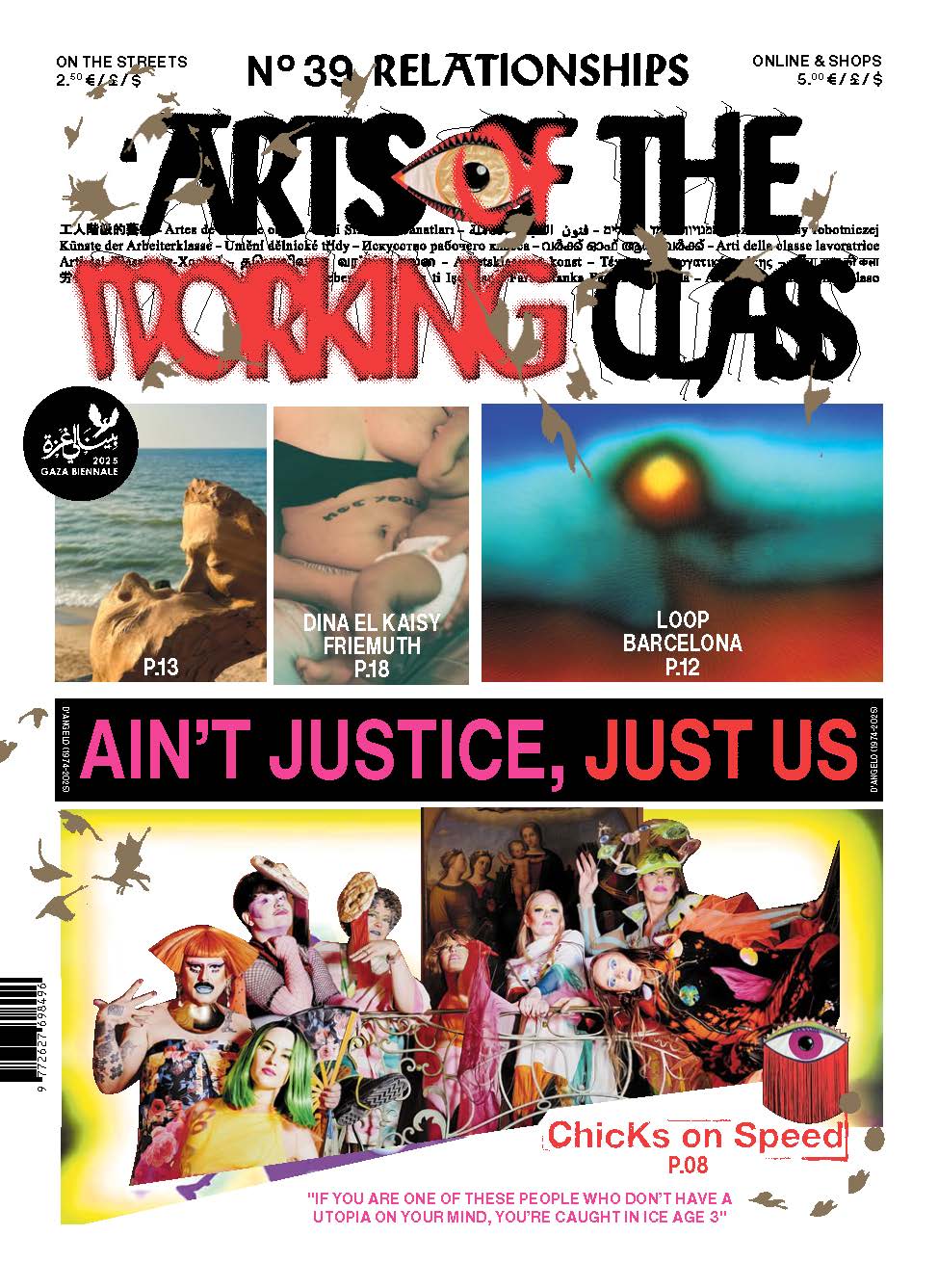Arts of the Working Class
ISSUE 39: RELATIONSHIPS
ISSUE 39: RELATIONSHIPS
Couldn't load pickup availability
This fall, a small fleet of boats set sail under the banner of the Global Sumud Flotilla: a fragile choreography of resistance and solidarity carrying artists, activists, and ordinary people with ordinary jobs, determined to breach the maritime siege of Gaza and make visible its destruction and occupation. The flotilla was never only about reaching its destination. Its value was measured not in success nor in spectacle, but in risks shared, solidarities enacted, and futures imagined together against overwhelming odds. This understanding of solidarity as practice is what Chicks on Speed underline in their survey exhibition at the newly reopened Villa Stuck in Munich.
As this year’s editorial cycle was titled Value Attachment—a poetic and materialist inquiry into how we assign worth to our worlds—the Sumud Flotilla offers a paradigm for what that question truly entails. The Gaza Biennial reasserts, in its own terms, the primacy of relationships as the ground on which politics is built. Not relationships as networks of exchange or capital, but as infrastructures of mutual dependence and resistance: fragile, chaotic, complex, indispensable.
Across the previous four issues in 2025, we have traced how this question recurs across different registers. Now, we turn to Relationships: to sentimental versions and terrains of struggle. Fascism, in its twenty-first-century iterations, thrives not only on nationalism and exclusion but on dismantling relational life: isolating, atomizing, privatizing it until solidarity becomes suspect and empathy itself a form of dissent. Proximity is policed, intimacy is surveilled. Love is reduced to transaction. Care is outsourced. Trust weaponized. Even friendship, the most basic form of political relation, is co-opted as a tool of influence and control.
The question is no longer whether relationships have political significance, but whether politics is even possible without them. This question is what the paintings of Arturo Kameya, last spring during the Amsterdam Art Week, and the poster by Russel Hlongwane and Lo-Def Film Factory (Francois Knoetze, and Amy Louise Wilson), in collaboration with the transnational project “99 Questions” at the Humboldtforum, address. To relate, and to persist in relating, is to resist the logics that seek to divide society. The works introduced as part of this year’s Loop Festival in Barcelona show how to rebuild forms of attachment that cannot be monetized, mapped, or monitored. It is to construct alliances that do not obey the imperatives of state or market, as well as to recognize that the liberation of an individual is entangled with the liberation of all—from the remaining streets of Gaza to the rainforests of the Amazon, from picket lines to refugee kitchens. It is to insist on anti-fascism as the departure point for the future.
The art world is not exempt from the same kinds of pressures. Too often, the language of community, engagement, and care is reduced to branding, sponsorship, and visibility, reproducing the hierarchies it claims to critique. Institutions extract value from relational labor that lacks redistributing power. Exhibitions, biennials, and programs become performances of solidarity rather than its practice. Filippa Ramos tells us, in conversation, how she works against this contradiction: by maintaining a sort of sobriety.
Calling out complicity is not enough. Constructive engagement demands that art institutions and practices build relationships that resist co-optation. This means, as our contributors argue, valuing labor—emotional, intellectual, and physical—not only within the narrow grid of art historical discourse but in material and permacultural reciprocity. It means placing relationality at the center of decision-making rather than treating it as decoration. In doing so, art becomes a social infrastructure rather than a simulacrum of it.
D’Angelo (1974–2025), now our ancestor, reminded us that in a world that denies justice at every turn, there “ain’t justice, just us.” In our attachments, in our persistence, in the care we give and receive, these are the places where the only justice possible is born.
With contributions by:
Octavia Abril, Anuscheh Amir-Khalili, Knut Birkholz, Catwing, Chicks on Speed, Clemente Ciarrocca, Sepp Eckenhaussen, Michel Esselbrügge, Will Furtafo, Giulia Ottavia Frattini, Dina El Kaisy Friemuth, Gaza Bienniale, Gluklya, Tris Hedges, Russel Hlongwane, Lo Höckner, Amelie Jakubek, Jean Kamba, Arturo Kameya, kina from ver.di, Francois Knoetze, Loop Barcelona, Dalia Maini, Julia Montilla, Diógenes Muniz, María Inés Plaza Lazo, Krishan Rajapakshe / Nachbarschaftshaus Urbanstraße e.V., Lilo Ruminawi, Spore Initiative, Catwings, and Amy Louise Wilson.


